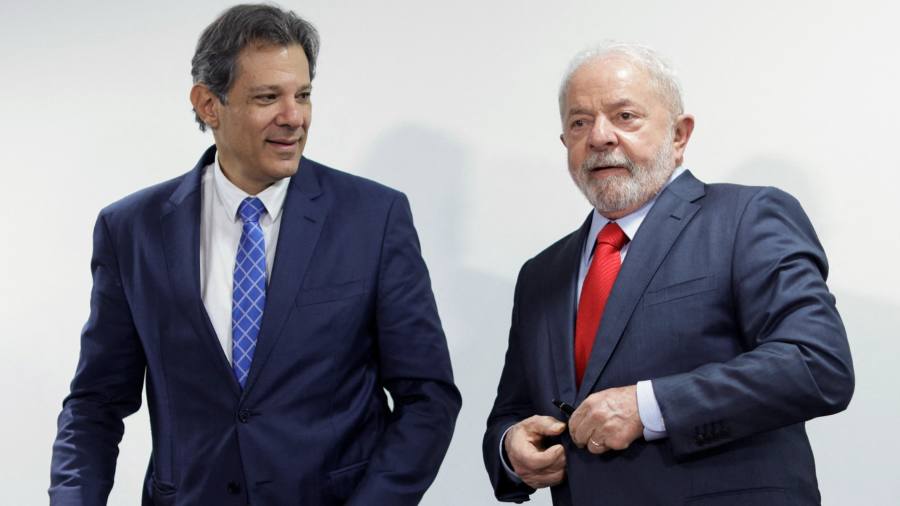President Luiz Inácio Lula da Silva wants to ease constraints on government spending in Brazil, expanding the role of the state in Latin America’s largest economy despite investors’ concerns.
Brasília is poised for a congressional vote in the coming weeks on draft legislation that will ensure real expenditure rises every year. If passed, the changes would enable the veteran leftwinger to allocate extra funds for infrastructure and welfare benefits, critical planks of the president’s pledge to end hunger in the nation of 208mn.
However, it would also mean breaking with a cap limiting budget increases to the rate of inflation. Introduced in 2017, the spending ceiling has become a pillar for the state’s fiscal credibility and has helped stabilise the South American nation’s level of indebtedness.
Ministers say Lula will strike a balance between fulfilling campaign promises and responsible management of the public accounts by committing to a balanced budget in 2024.
They also point to the president’s record during his first two terms in office between 2003 and 2010, when he rode a global commodities boom to lift tens of millions out of poverty through welfare programmes, while largely respecting economic orthodoxy.
But that has not prevented market disquiet about a possible leftward lurch towards less business-friendly policies. Worries have been compounded by the president’s frequent attacks on the country’s independent central bank, accusing it of denting growth by maintaining its benchmark lending rate at 13.75 per cent.
Of particular concern is the impact of the extra spending on public borrowing, which is relatively high for a developing economy at 73 per cent of gross domestic product.
“The new framework is unquestionably worse than the previous one when it comes to debt sustainability,” wrote Marcos Casarin, chief Latin America economist at Oxford Economics.
Market reaction to the new fiscal regime has been mixed so far. The target to eliminate a budget deficit next year has provided a degree of reassurance to some money managers.
Jared Lou, portfolio manager at William Blair, said: “We dislike the notion that a spending ceiling is being swapped for a spending floor, but we applaud the government’s intention to achieve a primary surplus in the next few years.”
While the new rules stipulate spending must grow annually by a minimum of 0.6 per cent above inflation — even when revenue collection falls — there is a maximum threshold of 2.5 per cent.
Under the proposals, annual expenditure is allowed to rise by up to 70 per cent of the preceding year’s increase in government income. This drops to 50 per cent if budget targets are missed.
To balance the books, finance minister Fernando Haddad intends to raise R$150bn ($30bn) by clamping down on tax evasion, closing loopholes and imposing duties on online gambling. Officials forecast total public revenues of R$2.37trn this year.
However, investment bank BNP Paribas said Haddad’s aims of eliminating the budget deficit — not accounting for debt interest payments — next year and generating a surplus by 2025 was “only achievable with tax increases and very optimistic assumptions”.
“When we play with the numbers we don’t get a primary surplus in two years, or the debt stabilised in three,” said its head of Latin America research, Gustavo Arruda. “The government is assuming much stronger growth than we believe is Brazil’s potential.”
Alberto Ramos, head of Goldman Sachs’ Latin American economics research team, said the new fiscal framework lacked teeth.
“There is no trigger mechanism that automatically forces some kind of adjustment if you don’t meet the targets. There’s no administrative penalty or sanction.”
Instead, the president would have to write to Congress explaining why goals were missed and outline remedial measures.
The exemption of certain areas from the rules, such as spending on federal universities and environmental projects — along with the creation of a floor for public investments and promises of higher minimum and public sector wages — would make it difficult to keep expenditure within the permitted band, Ramos added.
Another worry is that Lula may encounter political pressure from more radical elements of his base not to restrict public spending.
Designed to restore Brazil’s battered public finances to health following the economically disastrous presidency of Dilma Rousseff, Lula’s handpicked successor, the 2017 cap has long faced criticism from the left that it squeezes funds for essential public services and infrastructure.
However, the ceiling was legally bypassed to allow for Covid-19 support measures and again last year by Lula’s predecessor Jair Bolsonaro to boost handouts ahead of his failed re-election bid. Lula also obtained a congressional waiver before taking office to increase the payments further.
But a deeper problem is the chronic misallocation of Brazil’s state resources, experts say, along with its complex tax system.
More than 90 per cent of the country’s budget consists of mandated spending, mostly on pensions and public sector salaries, which can only be changed with congressional approval.
Lula’s task now is to guide the bill through a fickle and fragmented Congress, where his Workers’ party does not command a majority.
Rodrigo Pacheco, president of the Senate, told a conference in London last month that he expected the fiscal framework to be approved, although with some changes that he declined to specify.
Lucas de Aragão, partner at political consultancy Arko Advice, said the conservative-leaning Congress was unlikely to want big rises in spending.
“Congress is more conservative and right-leaning [than the president]. It has become more fiscally responsible . . . This reduces the space for adventurous spending.”
Additional reporting by Carolina Ingizza and Michael Stott
Read the full article here




